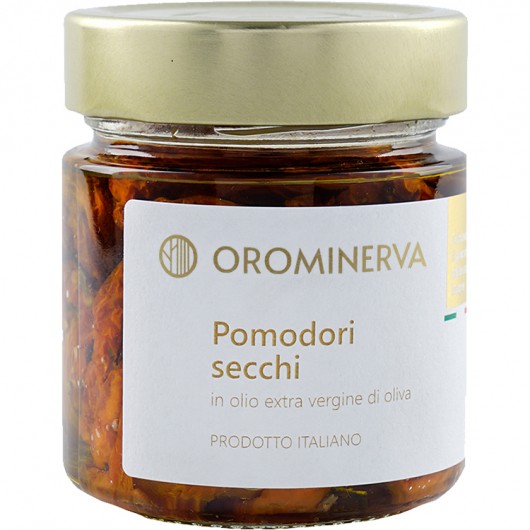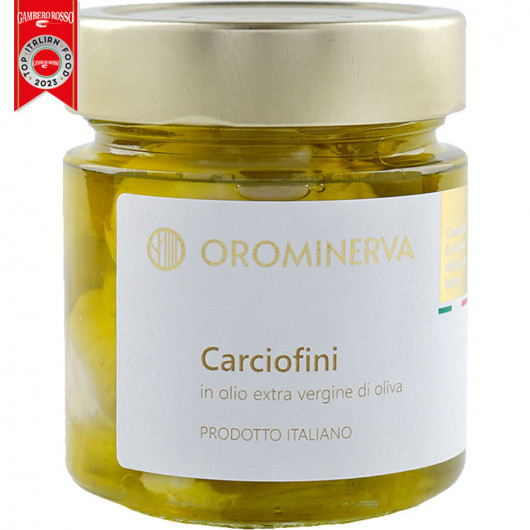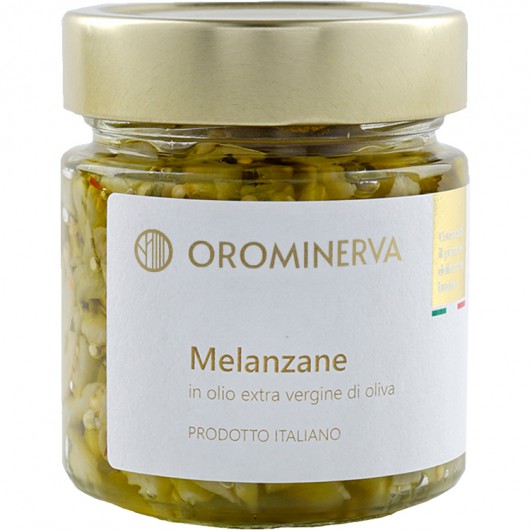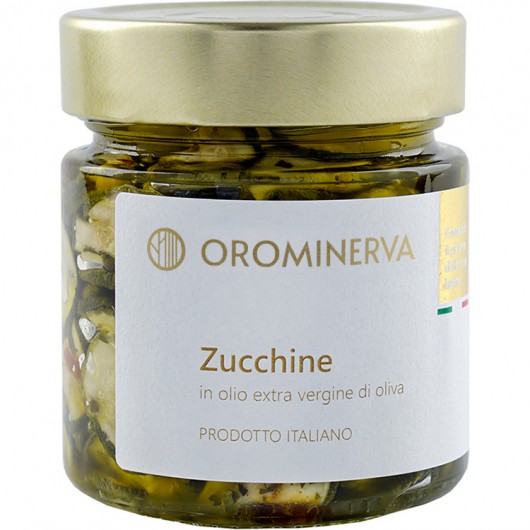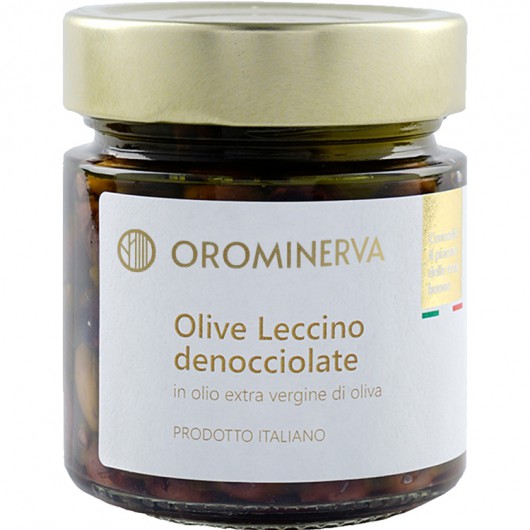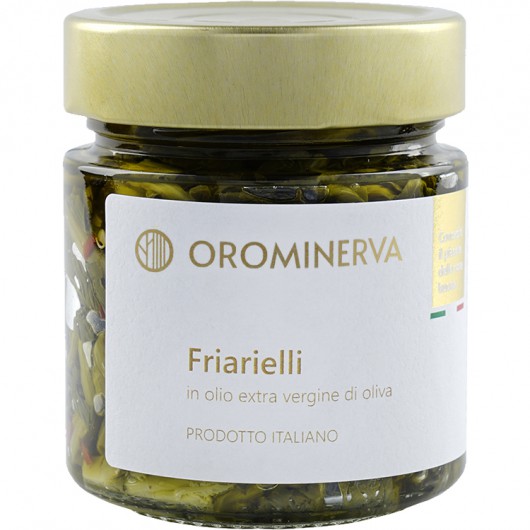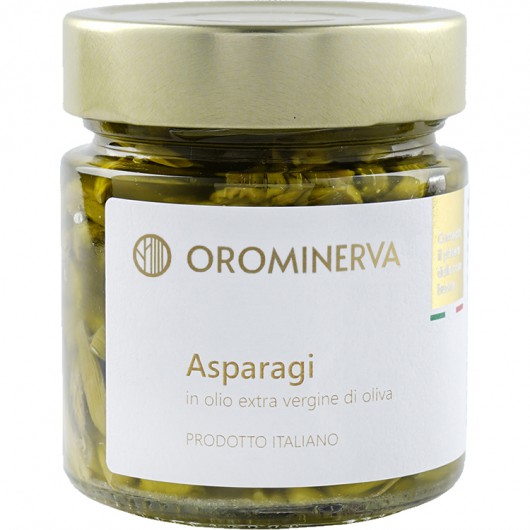Preservative-free preserved vegetables: the natural method that respects goodness
Are preservatives in preserves bad for you? What are the benefits of natural preservation? Let's find out more about them.

Preservative-free preserves are a rarity compared to those that contain preservatives. The reason is simple: for many companies, the use of artificial preservatives is the most convenient choice, both economically and logistically. They extend the shelf life of vegetables and make large-scale distribution easier.
We have chosen a different path. We know that more and more people are looking for authentic products, free of artificial additives, to rediscover the genuine taste of naturally processed ingredients. That is why we produce preservative-free preserves, processed using artisanal methods and selected raw materials, to offer pure flavours, exactly as nature created them.
Our preservative-free preserves are not to be found in the large-scale retail trade, but rank among the top delicatessen products. They are available directly here, in our online shop.
Natural preservation methods
In common preservatives, the use of preservatives is common practice. Among the most common preservatives are:
- Sorbic acid and potassium sorbate, which are effective against fungi and yeasts, but not against bacteria.
- Benzoic acid and its salts, used to counteract bacterial and fungal proliferation.
- Sulphites (E220-E228), powerful antimicrobial preservatives, but known for their allergenic potential.
- Propionic acid and its salts, mainly used to prevent mould growth.
- Citric acid and ascorbic acid, mainly used as antioxidants, with a mild preservative effect.
You will find none of these in our preserves.
To protect the quality of the ingredients and preserve it, we rely on artisanal processing methods, promoting natural preservation of the vegetables through the use of extra virgin olive oil and acidification with vinegar.
The alternative to preservatives in preserves is therefore a more careful and onerous production process that respects certain principles:
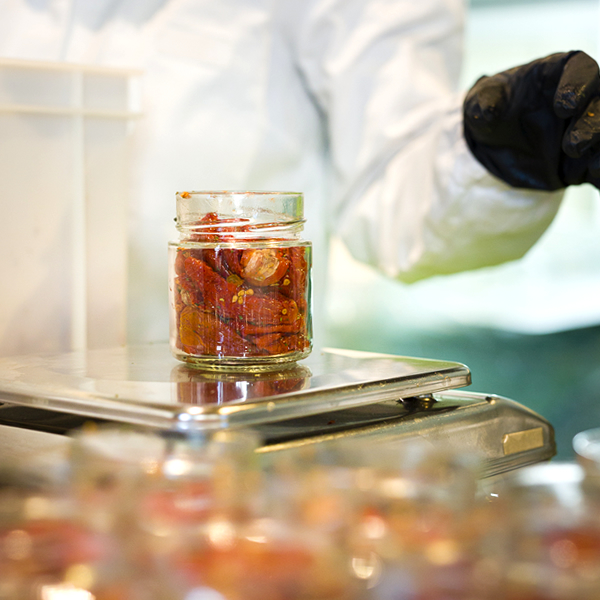
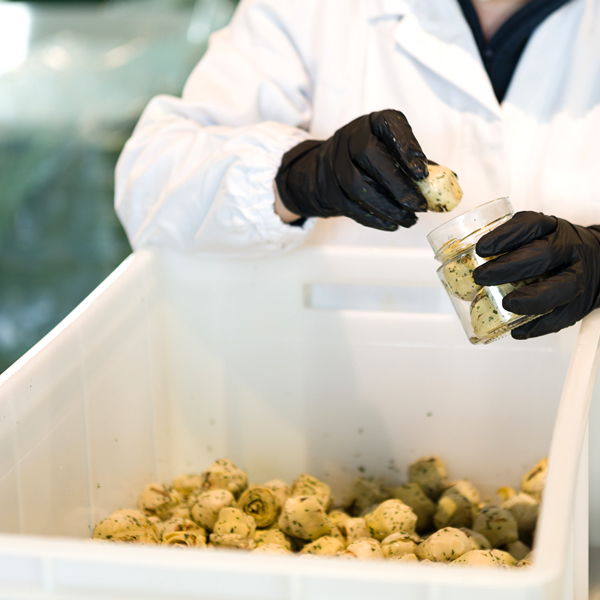
The alternative to preservatives in preserves is therefore a more careful and onerous production process that respects certain principles:
- Natural acidification. The addition of vinegar in very small quantities helps to create an acidic environment unfavourable to microbial growth. This method has always been used to increase food safety without resorting to synthetic preservatives.
- Using extra virgin olive oil. EVO oil is an excellent natural preservative due to its ability to create a protective barrier that isolates ingredients from the air, thus limiting the proliferation of mould and bacteria. It is essential that vegetables are completely immersed in oil to ensure effective preservation.
- Jar sterilisation. Before filling, the containers are thoroughly sterilised to eliminate any microorganisms that could compromise their preservation.
- Thorough drying. Removing residual moisture from vegetables is essential to reduce the risk of spoilage. Proper drying prior to potting helps prevent the formation of mould.
- Optimal storage conditions. In order to maintain the product's characteristics unaltered, preserves are stored in a cool, dry place away from heat and direct light before being sold.
Why EVO oil
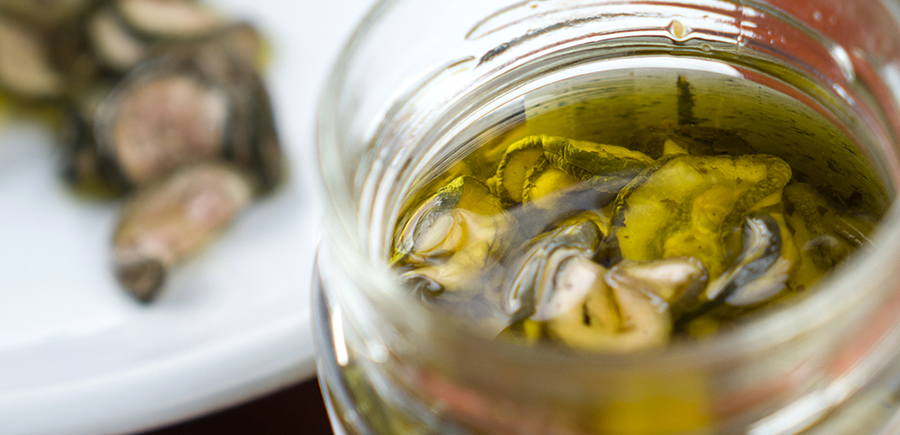
We know extra virgin olive oil as a valuable ingredient from a nutritional and organoleptic point of view. But, Evo oil also has another function: it plays an essential role in the preservation of preserves. Its characteristics make it a natural ally in preserving food quality.
Antioxidant properties
Rich in polyphenols, EVO oil helps to combat oxidation, protecting both its aromatic profile and preserved foods. These compounds, as well as providing greater stability over time, offer health benefits by helping to reduce inflammation and support lipid metabolism.
Flavour and sensory characteristics
The typical bitterness and spiciness of quality extra virgin olive oil are signs of the presence of polyphenols and a careful production process. These aromatic notes enrich the taste of preserves, giving them a unique sensory depth.
Preservative function
By creating a protective barrier that prevents contact with oxygen, EVO oil helps preserve food in oil, reducing the risk of mould and bacteria developing. This makes it a particularly effective natural preservation method for vegetables and greens.
The use of extra virgin olive oil in preserves is a return to traditions, where the preservation of vegetables was completely natural and enhanced the goodness of the ingredients without compromising their authenticity.
Our extra virgin olive oil

Orominerva's EVO oil is the ingredient that makes the difference in our preserves. It is an oil that we have always produced on the farm by processing - within a maximum of 24 hours after harvesting - the olives in our territories, which are particularly suited to this type of production.
Its quality can be seen and felt. We always recommend reusing the oil contained in the jars of preserves either with vegetables or in the preparation of other dishes or as a base for cooking. To throw it away would be a sacrilege, also in terms of waste.
To learn more about our oil read the dedicated article: Orominerva EVO oil.
The benefits of preservative-free preserves
Preservative-free preserves inspire greater confidence in terms of food safety. The effect of artificial preservatives contained in this type of product can be negative in the case of excessive consumption or in the face of allergies and intolerances.
Of course, natural preservation eliminates any risk. Preservative-free preserves have no long-term negative effects and are more suitable for people with a high sensitivity to certain substances.
Further benefits are also linked to:
- Natural flavour: preservative-free preserves retain a more genuine flavour, as they are not altered by added artificial substances.
- Nutrient assimilation: the presence of natural ingredients can promote better assimilation of essential nutrients such as vitamins and minerals.
- Environmental impact: often locally produced, preservative-free artisanal preserves have a lower environmental impact than industrial ones due to a more rational and green management of resources.
Are preservative-free preserves more expensive?
Preservative-free preserves are more expensive than those with preservatives. And the reasons are clear.
High-quality raw materials
High-quality raw materials and ingredients, such as EVO oil, are used, which are more expensive than those used by industrial companies. Some of the ingredients used for Orominerva preserves are produced directly by us; other raw materials come from growers, from Molise or neighbouring regions, who give quality the same importance as we do. So, only natural and tasty raw materials and ingredients.
Production process
Artisanal and careful processing requires time, labour and procedures that increase production costs. We wash vegetables and greens carefully, blanch them lightly so that they retain their initial properties in terms of nutrients and texture, and combine them with the other ingredients with the harmony needed to achieve a well-balanced organoleptic profile.
It is a path where good flavours meet craftsmanship and the desire to know how to wait for the right taste evolution. We don't speed up time to produce more, but let the wait contribute to something exceptional.
Absence of economies of scale
Artisanal products are produced in small quantities, they do not benefit from the economies of scale typical of industrial production. Due to the many dynamics, already explained, the cost per unit is much higher than that of an industrial product.
The quality of artisanal and preservative-free sottoli has a value. It is not the same as that of more common subolbs and, if you have read this far, you will have understood why.
Choosing preservative-free preserves means taking a step towards a more authentic, conscious and tasteful diet. It is a question of better ingredients, but not only that: it is the entire production philosophy that values respect for raw materials and a return to genuine flavours.
Those who know how to recognise and appreciate this kind of goodness also know how to give the right value to the pleasure derived from it!
